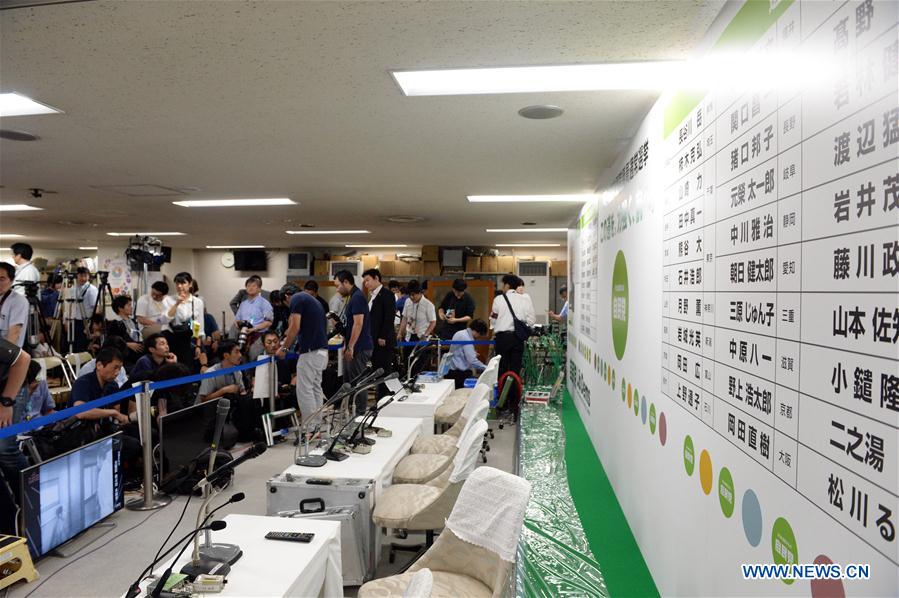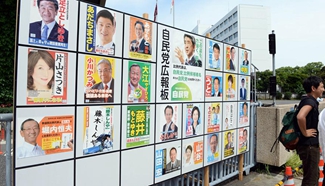
TOKYO, July 10, 2016 (Xinhua) -- Media workers wait for interviews at the headquarters of Liberal Democratic Party (LDP) in Tokyo, capital of Japan, on July 10, 2016. Voting for the Japanese parliament's House of Councillors, or the upper house, kicked off on Sunday with the main focus on whether or not the constitution-amending forces could take an overwhelming majority in the 242-member chamber. (Xinhua/Ma Ping)
By Yan Lei, Fang Yixiao
TOKYO, July 10 (Xinhua) -- "I cast two ballots, one for a Liberal Democratic Party (LDP) member, the other for an independent candidate, just because they looked competent on TV," said 30-year-old office worker Shibata, at a polling station in Shibuya Ward in Tokyo on Sunday.
"I am against amending the constitution, because it's likely to drag Japan into war. But I still voted for the LDP, because I don't like the opposition parties either. People say that the LDP is going to change the constitution. I really don't know what to do," she said, seeming at a loss about the future.
Shibata's words were echoed by Yamaguchi, a 20-year-old company employee who voted for the first time on Sunday. "I don't know much about these candidates. And I don't know what constitutional amendment really means to us," she told Xinhua after casting her ballots.
Sunday's election has 121 seats of Japan's 242-member House of Councillors up for grabs. Each voter is required to cast two ballots, one to choose the electoral district representatives for 76 of the 121 contested seats, the other under a proportional representation system to fill the remaining 45 seats with parties' listed candidates.
One of the main focuses is whether the pro-constitutional amendment camp, mainly comprising Japanese Prime Minister Shinzo Abe's ruling LDP, its coalition ally Komeito Party, and two other small opposition parties, will secure enough seats to take a two-third majority in the chamber, a prerequisite for revising the constitution.
Abe and the LDP candidates, for their part, called the election a referendum on the prime minister's over-three-year-old economic policy mix dubbed "Abenomics," stressing economic "achievements" in their campaign and pleading for more time, while evading topics about constitutional revision.
Katsuya Okada, President of the main opposition Democratic Party, called what Abe has been doing "underhanded," according to earlier reports, as it was only a strategy aimed at disarming voters such as Shibata and distracting them from the threat to the pacifist constitution, instead of giving up on the plan of revising the constitution.
But for Yamagami, a male voter in his 30s, Abe's campaign strategy failed to work. "I don't see any positive effects of the Abenomics. And I'm specifically against Abe's plan to revise the constitution. We should not stay quiet about such a scheme which could cause danger to the whole nation," he said.
"Abenomics, though pushing up the stock prices with its monetary policies, is meaningless and unhelpful to the common people as we ordinary Japanese people don't like buying stocks. So I voted against the LDP," said another middle-aged voter at the Shibuya polling station, requesting anonymity.
For Shibata, however, the problem is, if she did not vote for the LDP, who could she vote for, as in her eyes, the opposition parties seemed to have also failed to offer feasible solutions to the problems that Japan is faced with.
Sunday's upper house election also came at a time when Japan has lowered the voting age from 20 to 18, which increased the total number of the eligible voters in the country by about 2.4 million.
"The ruling party, in order to gain more votes, lowered the voting age. But giving voting power to teenagers who do not know much about politics could be dangerous to Japan," said the anonymous middle-aged voter in Shibuya.
"But on the other hand, young people, who are fearless and eager to voice their opinion, could bring new blood to Japan's politics," he added.











